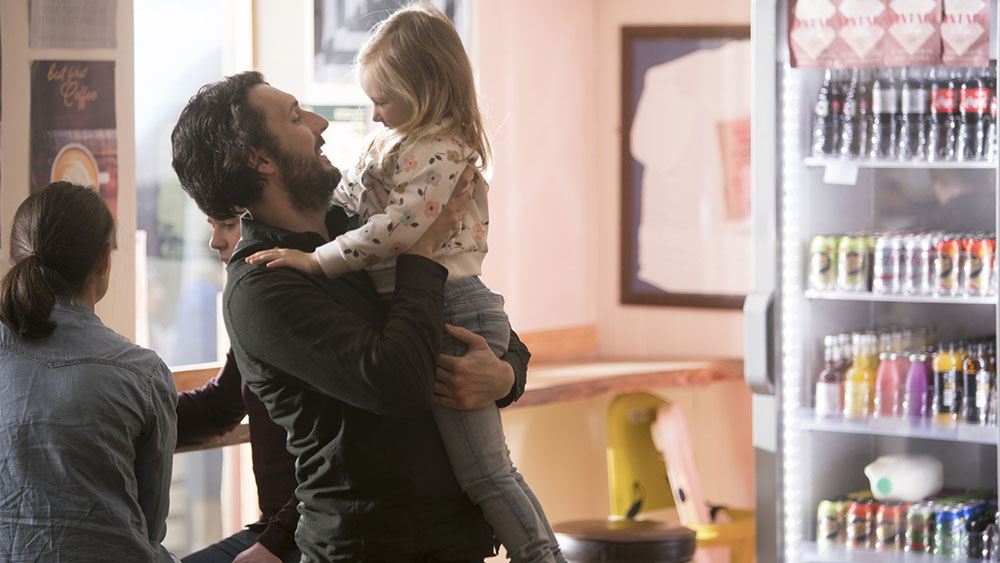Here’s our spoiler-filled review of Trust Me episode 2.
My review of last week’s episode touched on a little on the strange nature of the drama in Trust Me. The script and Jodie Whittaker’s performance engender much sympathy for her character, Cath Hardacre, while the direction and editing appear to try equally hard to use the unwritten tricks to convey the egregious nature of her transgression.
There were also subtle – and not so subtle – allusions to the class politics at play in her move from nurse to doctor. A few comments and a judgemental glance at her bottle of Lidl prosecco, contrasting reactions to receiving paycheques, the ‘us and them’ Nurse/doctor politics, the realism of her sheffield house to the almost soft-focus dreamlike exploration of her Edinburgh apartment and the decadence of her boss’ house. It all subtly adds to the drama.
As a nation that has been primed with the Thatcherite goal of improving our status’, but woken from the 80/90s dream of a ‘classless society’ into the reality of the world, we are naturally impressed and supportive of Cath’s mission to improve her lot in life and repulsed by the middle-management stitch up we’ve seen bring her down. Yet ultimately, we’re rooting for someone who is betraying and endangering everyone she treats, and betraying the trust of her new friends.

It makes for uncomfortable viewing. It’s almost queasiness-inducing for someone, like myself, who is married to a member of the medical profession. Trust Me can’t help but pose questions about the trust we put in people, and the statuses we afford them, some of which we don’t necessarily want to look at the answers to very closely.
The bottom line, though, is that Cath Hardacre is no hero; we can root for her as much as we want, but surely it will feel hollow if she somehow wiggles out of this situation without punishment. There’s also the creeping sense that someone else – random or otherwise – will pay for her crimes with their health.
Which is where we pick things up. Cath/Ally is responding to the journalist trying to track her down, and dealing with the emotional fallout of the romantic entanglements with fellow medic, Andy. Life is going on, but the pressure cooker of the deception is taking its toll – released in a desperate plea of “I don’t know what to do” during a medical emergency, where she is bailed out by Charlie.
Trust Me’s drama then falls into something of a rhythmic pattern. Cath gets into a situation that could possibly expose her – journalist, conference, pub, phonecall – but wriggles out of it, while all the time the people in her life are circling closer and closer to the truth. Into that rhythm, though, a few jarring moments are injected and some further colour added.
Charlie’s off-hand comment about working as a porter despite his academic performance hints that he has worked hard to overcome the obstacles in his way to becoming a doctor, Bridget appears to be wracked with guilt over decisions she perceives as having cost lives, Andy is wrestling with the fallout from his divorce and Ally’s off-hand attitude to their relationship. All, though, are being neatly manoeuvred by the script into a position where they could potentially rumble the ruse.
Bridget seems an expert bullshit spotter. Andy’s a sly Googler whose need to know more about Ally throws up the show’s interesting cliffhanger. Charlie’s a fellow refugee of the working classes who seems to recognise Ally as a fellow interloper into a world that’s not natively theirs. It could yet, though, be Cath’s reformed ex that poses the biggest threat to her deception.

So, as Cath drives back to Sheffield to see her ill father at the end of the episode, Trust Me’s drama needs to change gear too. The minor drama/major threat dynamic of the first two episodes needs to take a back seat now – and looks like it will in the face of Andy’s discovery of just who Cath Hardacre is – and we need to start working towards resolution. The vultures are still circling, the set-up work and the dramatic dynamics have been established, so it’s time to start working towards some reckonings for what has transpired.
This is, fortunately, a very enticing prospect for the concluding two episodes of Trust Me. The characters have been engaging enough, and the performances impressive enough, to warrant real investment in how all this is going to resolve. Whittaker, again, is never less than enthralling to watch, but it’s only through Trust Me’s peripheral characters that the interest be sustained.
Dan Sefton’s script drama pits your growing fondness for them – even Bridget, with her wine-swigging middle class swagger and girl-school zaniness gets her moment to be human here – against Whittaker’s righteous wrong-doing. Something’s got to give – but if you didn’t care about one of the sides of this equation, there would be nothing to care about.
That the script has gradually, subtly, filled in its original sketchy caricatures from episode 1 into people you a rooting for, and eschewed cartoonish villainy on all sides, is to its great credit. That everyone in Trust Me is trying to be a better person, just makes it all the more heart-rending to watch.

